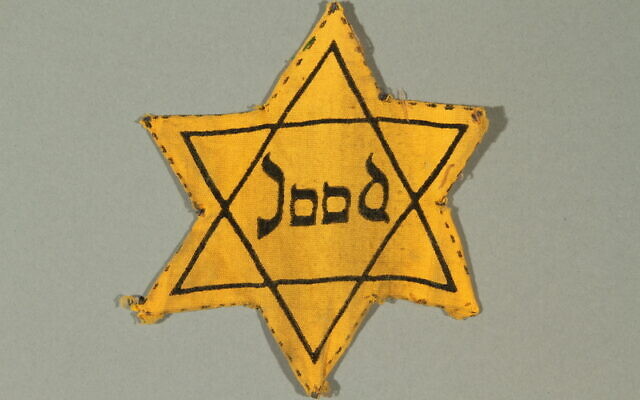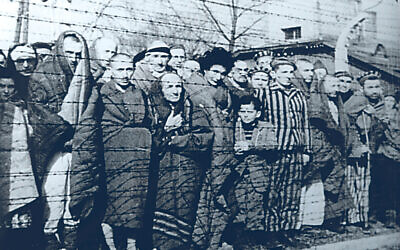Shocking survey finds ‘significant gaps’ in Holocaust knowledge in the Netherlands
Almost one in four Dutch Millennials and Gen Z believe the Holocaust is a myth, or that it happened but the number of Jews who were killed has been greatly exaggerated.

A new survey in the Netherlands reveal staggering data on the lack of knowledge about the Holocaust, in particular among younger people.
The Conference on Jewish Material Claims Against Germany (Claims Conference) released the “Netherlands Holocaust Knowledge and Awareness Survey” on Wednesday, in which 2,000 people were interviewed by Schoen Cooperman Research.
The survey found that 23% of Dutch Millennials and Gen Z respondents believe the Holocaust is a myth, or that it happened but the number of Jews who were killed has been greatly exaggerated.
In comparison, 15% of Millennials and Gen Z in the UK believe the same. Despite more than 70% of Jews who lived in the Netherlands were killed during the Holocaust, 53% of all Dutch respondents, including 60 percent of Dutch Millennials and Gen Z, don’t think the Holocaust happened in their country.
29% of Dutch respondents, including 37% of Millennials and Gen Z respondents, believe that two million or fewer Jews were killed during the Holocaust.

The lack of knowledge also includes the concentration camps, with 31% of all Dutch respondents unable to name a single camp or ghetto. Again, the number of people unaware is higher among Millennials and Gen Z, with 44% unable to name a camp or ghetto.
Previous studies showed a similar trend in the UK, with 32% of all British respondents, and 41% of Millennials and Gen Z unable to name a camp or ghetto.
The survey did however find that there is widespread agreement that Holocaust denial and Holocaust distortion are problems in the Netherlands today. 62% agreed with this.
65% also agree that there is widespread or some antisemitism in the Netherlands today. However, a staggering 22% of Millennials and Gen Z think it is acceptable for an individual to support neo-Nazi views.
Matthew Bronfman, Claims Conference Task Force Chairman, told Jewish News that the gap in knowledge of key historical facts about the Holocaust in The Netherlands and the growing concern about Holocaust denial and distortion “are the result of multiple factors.”
“Social media is part of the problem. It can be a great place to spread accurate information through thoughtful education campaigns. Unfortunately, social media is widely unchecked and serves as an equally strong platform for disinformation.”
Bronfman stressed the need to make Holocaust education a priority by government and educators.
“World War II was nearly 80 years ago. The population of first-hand witnesses who can speak to the events of the Holocaust and give students a real understanding of the personal cost of such atrocities is waning. It is urgent that we create programs for Holocaust education and survivor testimony. The bright light in this survey is that a good percentage of respondents, not just in The Netherlands but across all of the countries we have surveyed, want continued and more robust Holocaust education,” he said.
Max Arpels Lezer, a Holocaust survivor from the Netherlands, said it was important for him as a survivor that “future generations learn about and understand the history of the Holocaust.”
“I am upset and deeply concerned by these findings. That many of my countrymen do not even know their own national history. Without education, future generations will not understand the full impact of the Holocaust in my country. It is of utmost importance for us who survived that the future generations carry forward our testimonies even when we are gone,” Lezer added.

Thank you for helping to make Jewish News the leading source of news and opinion for the UK Jewish community. Today we're asking for your invaluable help to continue putting our community first in everything we do.
For as little as £5 a month you can help sustain the vital work we do in celebrating and standing up for Jewish life in Britain.
Jewish News holds our community together and keeps us connected. Like a synagogue, it’s where people turn to feel part of something bigger. It also proudly shows the rest of Britain the vibrancy and rich culture of modern Jewish life.
You can make a quick and easy one-off or monthly contribution of £5, £10, £20 or any other sum you’re comfortable with.
100% of your donation will help us continue celebrating our community, in all its dynamic diversity...
Engaging
Being a community platform means so much more than producing a newspaper and website. One of our proudest roles is media partnering with our invaluable charities to amplify the outstanding work they do to help us all.
Celebrating
There’s no shortage of oys in the world but Jewish News takes every opportunity to celebrate the joys too, through projects like Night of Heroes, 40 Under 40 and other compelling countdowns that make the community kvell with pride.
Pioneering
In the first collaboration between media outlets from different faiths, Jewish News worked with British Muslim TV and Church Times to produce a list of young activists leading the way on interfaith understanding.
Campaigning
Royal Mail issued a stamp honouring Holocaust hero Sir Nicholas Winton after a Jewish News campaign attracted more than 100,000 backers. Jewish Newsalso produces special editions of the paper highlighting pressing issues including mental health and Holocaust remembrance.
Easy access
In an age when news is readily accessible, Jewish News provides high-quality content free online and offline, removing any financial barriers to connecting people.
Voice of our community to wider society
The Jewish News team regularly appears on TV, radio and on the pages of the national press to comment on stories about the Jewish community. Easy access to the paper on the streets of London also means Jewish News provides an invaluable window into the community for the country at large.
We hope you agree all this is worth preserving.





















